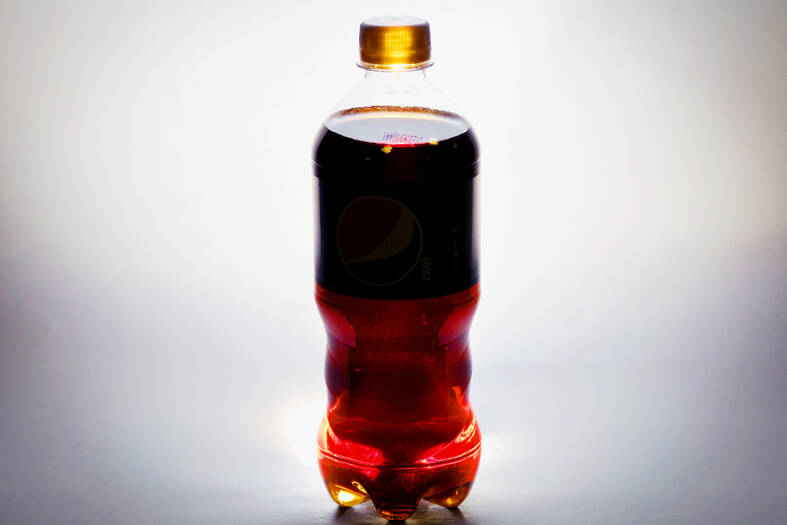Aspartame, a sweetener, is a “possible carcinogen,” but it remains safe to consume at agreed levels, two groups linked to the WHO said yesterday.
The rulings are the outcome of two separate WHO expert panels, one of which flags whether there is any evidence that a substance is a potential hazard and the other that assesses how much of a real-life risk that substance actually poses.
Aspartame is one of the world’s most popular sweeteners, used in products from Coca-Cola diet sodas to Mars’ Extra chewing gum.

Photo: AP
At a news conference ahead of the announcement, Francesco Branca, director of the WHO’s Department of Nutrition for Health and Development, said that people weighing beverage choices should consider neither aspartame nor sweetener.
“If consumers are faced with the decision of whether to take cola with sweeteners or one with sugar, I think there should be a third option considered — which is to drink water instead,” Branca said.
In its first declaration on the additive, announced early yesterday, the Lyon, France-based International Agency for Research on Cancer said that aspartame was a “possible carcinogen.”
That classification means there is limited evidence that a substance can cause cancer.
It does not take into account how much a person would need to consume to be at risk, which is considered by a separate panel, the Geneva, Switzerland-based WHO and Food and Agriculture Organization Joint Committee on Food Additives.
After undertaking its own comprehensive review, the committee said that it did not have convincing evidence of harm caused by aspartame and continued to recommend that people keep their consumption levels of aspartame below 40mg/kg a day.
The committee first set this level in 1981 and regulators worldwide have similar guidances.
Several scientists not associated with the reviews said that the evidence linking aspartame to cancer is weak.
Food and beverage industry associations said that the decisions showed aspartame was safe and a good option for people wanting to reduce sugar in their diets.
The WHO said the existing consumption levels meant, for example, that a person weighing 60kg to 70kg would have to drink more than nine to 14 cans of soda daily to breach the limit, based on the average aspartame content in the beverages — about 10 times what most people consume.
“Our results do not indicate that occasional consumption could pose a risk to most consumers,” Branca said.
Reuters first reported last month that the International Agency for Research on Cancer would put aspartame in group 2B as a “possible carcinogen” alongside aloe vera extract and pickled vegetables.
The research panel said yesterday that it had made its ruling based on three studies in people in the US and Europe that indicated a link between hepatocellular carcinoma, a form of liver cancer, and sweetener consumption, the first of which was published in 2016.
Limited evidence from earlier animal studies was also a factor, it said.

Kehinde Sanni spends his days smoothing out dents and repainting scratched bumpers in a modest autobody shop in Lagos. He has never left Nigeria, yet he speaks glowingly of Burkina Faso military leader Ibrahim Traore. “Nigeria needs someone like Ibrahim Traore of Burkina Faso. He is doing well for his country,” Sanni said. His admiration is shaped by a steady stream of viral videos, memes and social media posts — many misleading or outright false — portraying Traore as a fearless reformer who defied Western powers and reclaimed his country’s dignity. The Burkinabe strongman swept into power following a coup in September 2022

‘FRAGMENTING’: British politics have for a long time been dominated by the Labor Party and the Tories, but polls suggest that Reform now poses a significant challenge Hard-right upstarts Reform UK snatched a parliamentary seat from British Prime Minister Keir Starmer’s Labor Party yesterday in local elections that dealt a blow to the UK’s two establishment parties. Reform, led by anti-immigrant firebrand Nigel Farage, won the by-election in Runcorn and Helsby in northwest England by just six votes, as it picked up gains in other localities, including one mayoralty. The group’s strong showing continues momentum it built up at last year’s general election and appears to confirm a trend that the UK is entering an era of multi-party politics. “For the movement, for the party it’s a very, very big

ENTERTAINMENT: Rio officials have a history of organizing massive concerts on Copacabana Beach, with Madonna’s show drawing about 1.6 million fans last year Lady Gaga on Saturday night gave a free concert in front of 2 million fans who poured onto Copacabana Beach in Rio de Janeiro for the biggest show of her career. “Tonight, we’re making history... Thank you for making history with me,” Lady Gaga told a screaming crowd. The Mother Monster, as she is known, started the show at about 10:10pm local time with her 2011 song Bloody Mary. Cries of joy rose from the tightly packed fans who sang and danced shoulder-to-shoulder on the vast stretch of sand. Concert organizers said 2.1 million people attended the show. Lady Gaga

SUPPORT: The Australian prime minister promised to back Kyiv against Russia’s invasion, saying: ‘That’s my government’s position. It was yesterday. It still is’ Left-leaning Australian Prime Minister Anthony Albanese yesterday basked in his landslide election win, promising a “disciplined, orderly” government to confront cost-of-living pain and tariff turmoil. People clapped as the 62-year-old and his fiancee, Jodie Haydon, who visited his old inner Sydney haunt, Cafe Italia, surrounded by a crowd of jostling photographers and journalists. Albanese’s Labor Party is on course to win at least 83 seats in the 150-member parliament, partial results showed. Opposition leader Peter Dutton’s conservative Liberal-National coalition had just 38 seats, and other parties 12. Another 17 seats were still in doubt. “We will be a disciplined, orderly